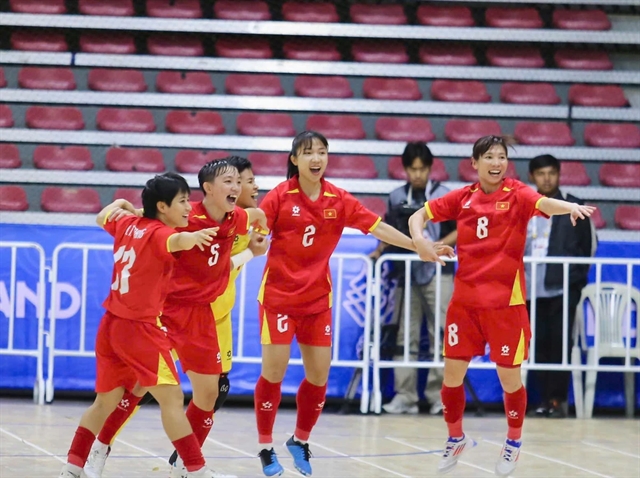 Sports
Sports

" />In the past, many have criticised mega events like the World Cup and the Olympics for the construction of huge venues which are left empty after the tournament. Qatar is working with local communities to ensure they get what they need out of the event.
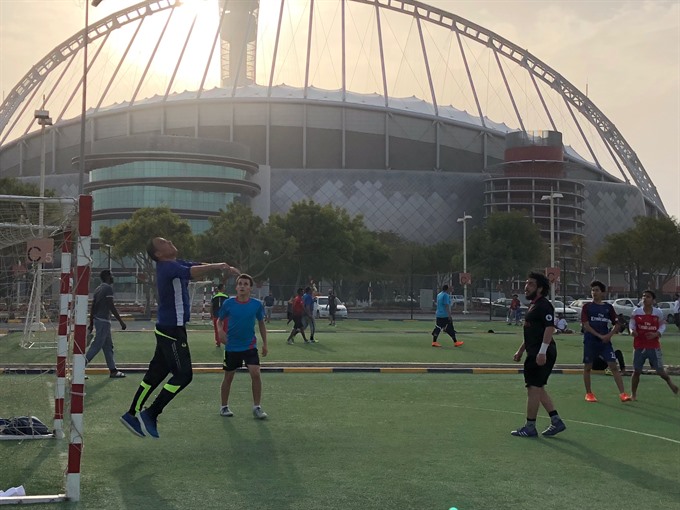 |
| Keeping active: Men play football outside one of the 44,000-seat Al Rayyan stadium in Doha. VNS Photos Nguyễn Mỹ Hà |
By Nguyễn Mỹ Hà
Mini football pitches have sprung up around new stadiums being built for the World Cup in Qatar in 2022. On a spring day, with temperatures between an ideal 21 to 24 degrees Celsius, the spaces are full of people playing the beautiful game.
“Football is the national sport here in Qatar,” says Huan He, 24, from China who works in Doha. “If you are a professional player, and your team won the Asian Cup just last month, you get a mansion, a luxury car and a huge amount of cash.”
Then he sighs, “I dreamed of becoming a professional player, but I injured my knees, and had to stop.”
Huan may not be able to play, but if he stays to work in Doha until 2022, he may be able to join millions of other football fans to celebrate the World Cup. The event marks the first in the Middle East and only the second in Asia.
Work started in 2010, when Qatar won its bid to host the World Cup. The country has a population of just over 2.5 million on 11,500 square kilometres of land.
Qatar’s Supreme Committee for Delivery and Legacy is located in a new building in Doha, which also houses the Qatar Football Association and Qatar Olympic Committee. The 400-strong committee has to make sure the stadiums are built on time, and other infrastructure like the airport, railways and airlines are co-ordinating in preparation for 2022.
“Our responsibility is to make sure Qatar is ready to host, probably about one and a half million fans in 2022,” says John Winder Davies, a consultant from the UK at the Supreme Committee for Delivery & Legacy.
Delivery means making sure stadiums are built. The Legacy side of it is to make sure the tournament creates a positive lasting legacy afterwards.
For this endeavour, Barcelona is a good example. Before the Olympics in 1992, the city was considered a backward area of Spain. After the Olympics, the city became a massive part of the local economy and generally revitalised the region.
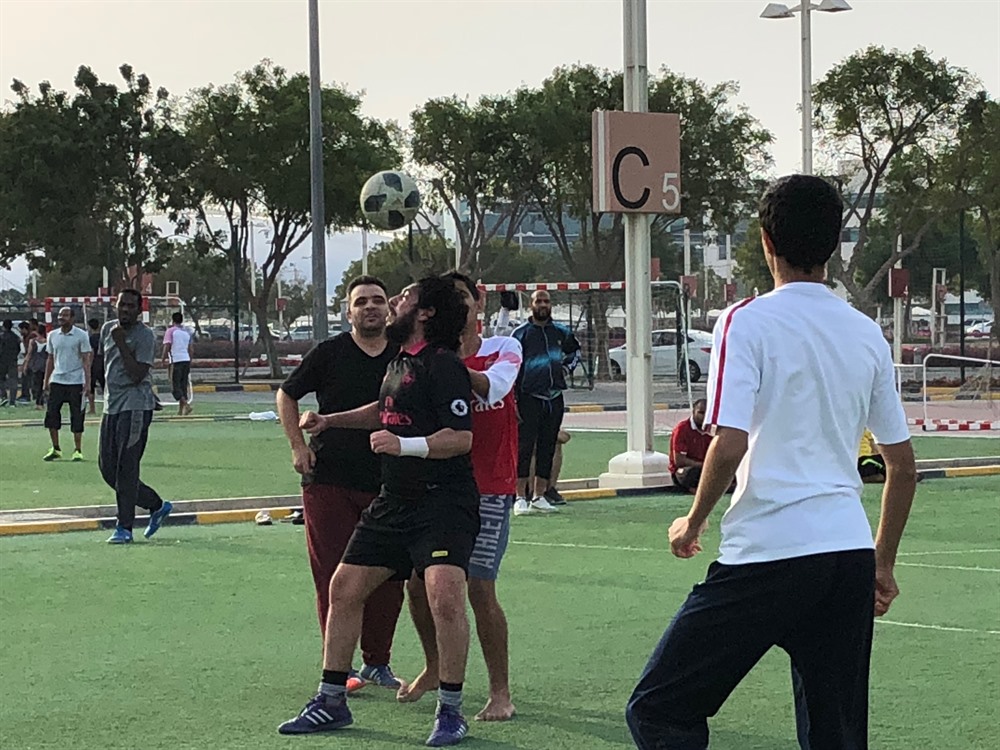 |
| Relaxation: After a long day at work, people enjoy a game of football. |
Football passion
Hosting us at the Pavilion, which is a museum in Qatar’s World Cup plan, Davies took us on a tour to see how the country is preparing for the massive tournament.
“We’re building eight more stadiums,” said Davies, “We’ve got one and we’re building seven more.”
Though Qatar has a rich football history, it doesn’t have 40-, 50- or 80-thousand seat stadiums, of the kinds needed to host a tournament as big as the World Cup.
The airport in Doha is being expanded to welcome 50 million passengers per year by 2022. The metro is due to open any month now. That will connect all of the stadiums. They are all within one or two-kilometres from the metro stations. And that will take about 200,000 cars off the road by 2022, once it’s fully operational. The red line will open this year.
Qatar is a small country, so it is trying to offer a different, if not unique fan experience in 2022.
In contrast to larger countries like Brazil and Russia, where players have to fly between games in the group stage, in Qatar, all the stadiums are located around the city. Distance takes away training opportunities, and for fans, means they can’t go to more than one game in a day.
“All the stadiums are built within a 20-km radius of Doha centre,” says Davies, “So fans won’t have to spend more than an hour travelling between them and can watch more than two games in one day.”
With stadiums close together, players can stay in one place and train. They won’t be exhausted from long travel.
“We expect to build 80,000 rooms for the tournament, maybe as many as 100,000,” Davies says. “But we’re going to complement that with hotel rooms on cruise ships so that we don’t have to build hotels that are empty after the tournament.”
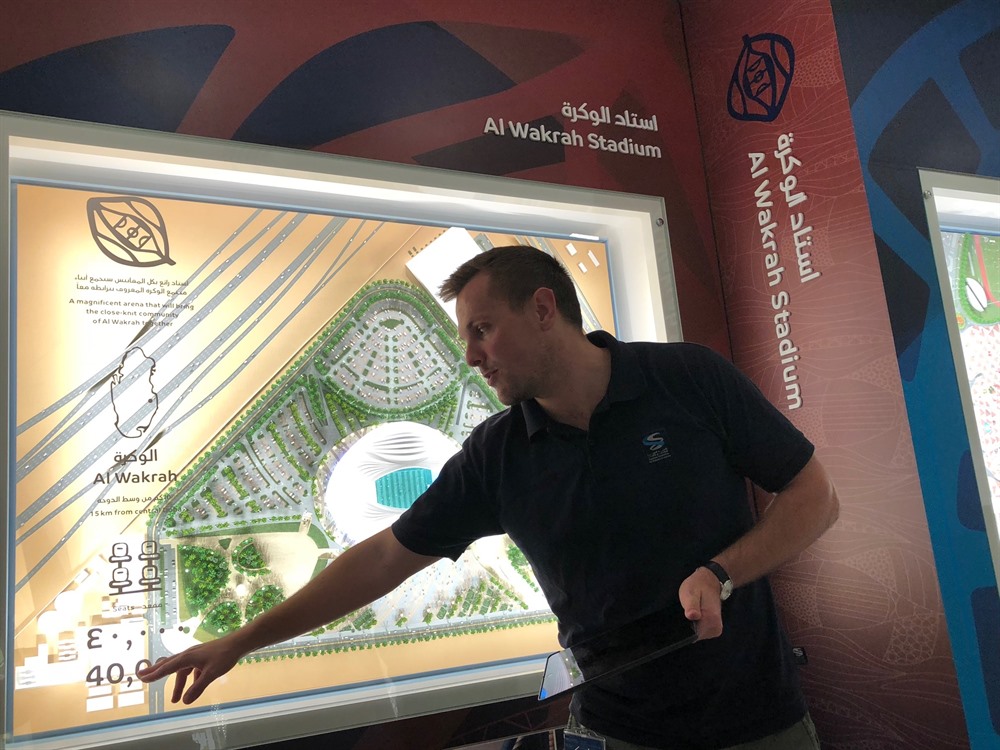 |
| Planning: John Davies talks about the stadiums being built for the World Cup. |
World Cup bid
In the 1960s, the Qatar Football Association was formed.
In the 1980s, the youth team made it all the way to the final of the 1984 Gulf Cup of Nations. It was a big moment for the national team. Ten years later, they did it again at the Olympic Games in Barcelona, when the team made it to the quarter finals of that tournament.
In 2010, Qatar won its bid to host the World Cup in 2022. Qatar is trying to make it clear that it’s not just a football tournament; it is part of the country and region’s development.
Qatar started bringing in big football names during the bidding process, such as Batistuta, Guardiola and Zinadine Zidane. But they are also football players, who had worked in Qatar, so they knew the football culture and the passion for football.
Qatar even changed the colour of its flag since the bid and wrote its bid in all four FIFA languages, and it also had a woman on the pitching committee.
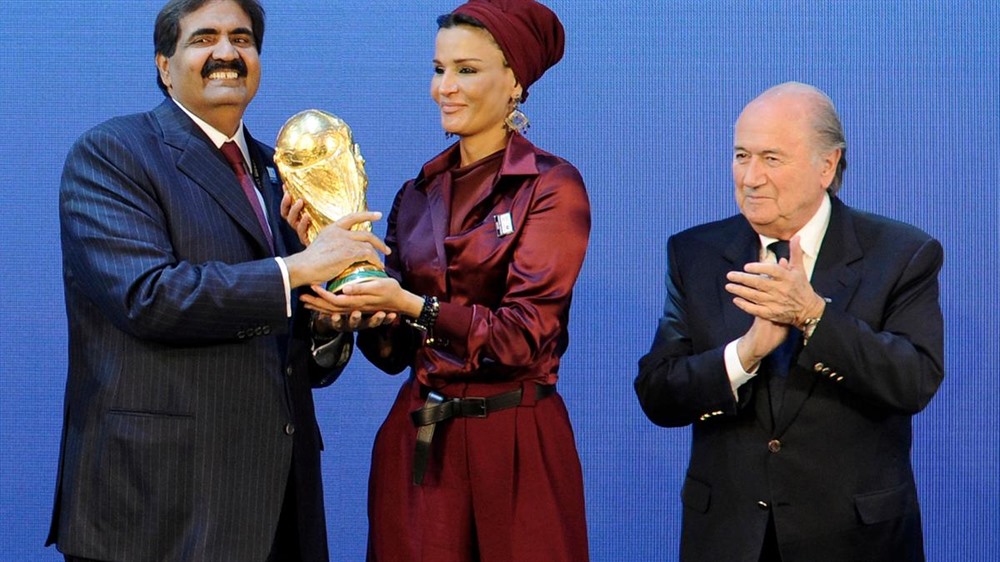 |
| Historic: Qatar’s Emir Sheikh Hamad bin Khalifa Al Thani (right) and his wife Sheikha Moza bint Nasser Al Missned (centre) receive the World Cup trophy from FIFA president Joseph Blatter after the official announcement that Qatar will host the 2022 World Cup at the FIFA headquarters in Zurich on December 2, 2010. AFP Photo |
Legacy
Qatar is a rapidly growing economy and country and the World Cup fits perfectly into that strategy. Hotels, as part of Qatar’s national development strategy, have been built around tourism, so there are already a lot of hotels under construction. More hotels are being built to meet the 60,000 rooms required by FIFA during the tournament.
“Another part of the committee strategy,” continues Davies, “is to have about 20,000 football fans staying on cruise ships in the bay for the tournament. After the tournament, they all will sail away and you won’t have 20,000 empty hotel rooms.”
The final part of the accommodation strategy is desert camping. So there will be 10,000-15,000 people camping in the desert as well.
Tourists can visit many museums around the city’s historical sites, such as the National Museum of Qatar, opened on March 28, the Museum of Islamic Art, the Fire Station and there are plenty of souqs – Qatar’s traditional markets, that still exist in all the landmarks of the city.
A state of the art metro and an upgraded road network are being built to add to the city’s transport system. It means that maximum travel time to any of the venues will be no more than one hour.
Due to the harsh climate of summer in Doha, when temperatures exceed 40 C, the World Cup has been changed to take place from November 20 till December 18, 2022, which is Qatar’s National Day.
Average temperatures during these month stays between 21-24 C, but a cutting-edge cooling system has already been planned for all the stadiums and is accessible to all, players and spectators.
Stadiums
In the past, criticism of mega events like the World Cup and the Olympics has revolved around the “white elephants”, which are big venues that are not used after the tournament. So communities are being consulted to make sure they get what they need from the stadiums and the area around them, whether it’s a shopping mall, a school, a market, or even a wedding hall. Their needs are reflected in the planning.
“Each stadium boasts the latest innovations, seamlessly integrated into breath-taking designs. Every stadium, unique unto itself, has its own personality. Each is inspired by the values that define our delivery. They tell the story of Qatar and the Middle East through motifs that represent a storied past and bright future,” reads the voice over of the brief film shown at the Pavilion.
All the stadiums have been designed with legacy in mind, the stadiums and their surrounding precincts will benefit the communities in which they are located for many years to come: one 80,000-seat stadium, one 60,000-seat and six other 40,000-seat stadiums.
Modular construction will allow for easy downsizing once the tournament is completed. The detachable apparatus of the stadiums will be sent to developing countries, a key promise in the legacy event planning.
Khalifa International Stadium is the most iconic stadium for Qatari sport and football fans. This is home to the Qatar National Team. Even though it’s not the biggest stadium, after the World Cup, the 40,000-seat stadium will stay intact and go back to the National Football team.
Al Thumama Stadium is designed by a Qatari architect, Ibrahim Manjayno. The headdress Qatari men wear, called the keffiyeh, is the inspiration for this 40,000-seat stadium.
On top of that, Education City, a brand new 40,000-seat stadium, is being built in the north. Education City has its own transport system with buses, cars and even water taxis for tourists. After the tournament, 20,000 seats will go to universities for students to use.
Ras Abu Aboud Stadium is unique in terms of World Cup stadiums. It uses shipping containers. So the shipping containers are manufactured in China and everything is included in that container. When they arrive, the containers will be constructed, inspired by Lego, and after the tournament, they all come down again.
So afterwards, there are some options – you could build a 40,000-seat stadium somewhere else, or make four 10,000-seat stadiums and redevelop it as you want, which has never been done before.
Finally the biggest stadium, hosting the World Cup opening and final, is an 80,000-seat stadium called Lusail Stadium. A brand new city is being built. The current plan is for the roof to cover a market, school and office complex. After the tournament, components of the stadium will become part of the city, but the stadium itself will not exist anymore because the local community won’t need an 80,000-seat stadium.
As a farewell, I asked Davies to say something to Vietnamese football fans on camera, he says, “Everybody in Việt Nam, please come to Qatar in 2022!” which inspired Chinese Huan so much, he repeated my request, but to address China. Imagine everybody in China coming over to Qatar for the World Cup! VNS




